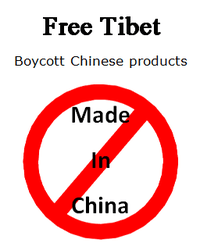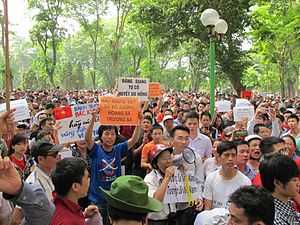Boycott Chinese products

Boycott Chinese products (Boycott Made in China or stop using Chinese products, stop buying Chinese goods) is a popular slogan of Internet campaigns to boycott Chinese-made products. Commonly cited reasons for the boycott include the perceived low quality of products and conflicts over territory.[1][2][3] Countries including India, Philippines, and Vietnam have called for the boycott of Chinese goods, as have separatist movements of China itself. It is considered difficult to fully boycott Chinese products, as the country is responsible for the assembly of a high number of goods that are widely sold and used across the world.[4]
Causes
China is the most populous country in Asia [5] and the fourth largest country in the world, sharing long borders with several other nations.[6] Border conflicts have occurred many times between China and their neighbors during its history.[5] At the center of Asia, some Chinese emperors attempted to expand their kingdom through war. As a result of these conflicts, there is dissent against China amongst its border nations, and calls for the boycotting of Chinese products originate from residual resentment due to border conflicts.
In 1949, Chinese communists took control of China and declared independence.[7] Since then, Chinese leaders have made economic development one of their first priorities.[8] Chinese businesses often produce goods tailored to market expectations; therefore, Chinese products may not be high in quality [9] when consumers prefer to pay a low price.
Overpopulation is also an indirect reason for manufacturing low quality and fake products (counterfeiting). Many firms cannot find enough of the needed raw materials to produce goods that serve the customer requirements, producing instead counterfeit versions made with cheaper material. Others copy the products of famous corporations such as Apple, Hyatt and Starbucks,[10][11] or have copied both the products of prominent brands and the entire store.[12]
The 2008 Chinese milk scandal was considered a signal of poor food safety, affecting thousands of people, and as a result many Chinese parents do not trust Chinese milk products. [13]
Boycott
India
Indian and Tibetan called for a joint campaign to boycott Chinese goods due to border intrusion incidents.[14][15] RSS chief Mohan Bhagwat declared: We speak about self-dependence and standing up to China. The new government seems to be standing up to it. But where will the government draw strength from if we don't stop buying things from China? [16]
Many shops in India also began to boycott Chinese goods.[17]
Philippines
Many nationwide campaigns were held by different groups to boycott Chinese products.[18] Albay Gov. Joey Salceda supported Filipinos to boycott Chinese products over the Spratly Islands dispute which was Scarborough Shoal standoff in 2012.[19][20]
Vietnam

The tension about the disputed areas in the South China Sea with China, especially the case Haiyang Shiyou 981 standoff, have triggered some boycott movements in this country.[21] The usage of Made-in-Vietnam goods is an incentive method to show the patriotism over South China Sea conflicts.
Tibet
Professor Thupten Norbu, brother of Dalai Lama, called for a campaign to boycott Chinese products for seeking Tibet independence.[2][22][23] He said: I am confident that the campaign to boycott Made-in-China products will gain the support of freedom loving people around the world, and will eventually succeed in forcing China to respect the rights of its own people and acknowledge Tibetan independence. […] I call on all Tibetans and friends to join with us in the pure and sacred struggle to free our country.[24]
People called for a boycott because of low quality and unsafe Chinese products.[25][26]
See also
- Environmental tariff
- Industrial pollution in China
- Do not buy Russian goods!
- Chinese boycotts of Japanese products
- Great American Boycott
References
- ↑ "Lucknow cleric gives call to boycott Chinese products". Retrieved October 19, 2014.
- ↑ 2.0 2.1 "Boycott Made in China : SFT Canada – Students for a Free Tibet Canada". Retrieved October 19, 2014.
- ↑ "The call to boycott Chinese products". Retrieved October 19, 2014.
- ↑ "Netizens clamour for boycott of ‘Made in China’ products". Retrieved October 20, 2014.
- ↑ 5.0 5.1 Xiaobing Li (2012). China at War: An Encyclopedia. Publisher ABC-CLIO. ISBN 1598844156. Preface XV.
- ↑ "The World Factbook". Retrieved October 22, 2014.
- ↑ Mikhail Iosifovich Sladkovskiĭ (1966). History of Economic Relations Between Russia and China. Publisher Transaction Publishers. ISBN 1412825199. Page 236.
- ↑ "China, Japan can help by helping themselves". Retrieved October 22, 2014.
- ↑ Pula, Gabor& Santabárbara, Daniel (March 2011). Is China climbing up the quality ladder? Estimating cross country differences in product quality using Eurostat's COMEXT trade database. WORKING PAPER SERIES.
- ↑ "China's fake Apple shops point to impatience for the newest products". the Guardian. Retrieved October 24, 2014.
- ↑ "Copycat China Still A Problem For Brands & China's Future: Just Ask Apple, Hyatt & Starbucks". Forbes. Retrieved October 24, 2014.
- ↑ "China takes knock-offs to a new level, copying entire stores - USATODAY.com". USATODAY.COM. Retrieved October 28, 2014.
- ↑ Why it’s Still So Hard to Find Safe Baby Formula By Qi Yue (启越) The Economic Observer Online 2013-06-13 17:44
- ↑ "Indo". Retrieved October 20, 2014.
- ↑ "Boycott Chinese products, says prominent cleric in Eid sermon". Zee News. Retrieved October 20, 2014.
- ↑ "Boycott Chinese goods, says RSS chief Mohan Bhagwat in DD telecast : India, News". Retrieved October 20, 2014.
- ↑ "Shops in India join Chinese goods boycott campaign". Retrieved October 20, 2014.
- ↑ News Desk in Washington/Philippine Daily Inquirer. "Filipino, Vietnamese Americans call for boycott of 'Made in China' products". Yahoo News Philippines. Retrieved October 19, 2014.
- ↑ "Philippine governor calls for boycott of 'Made in China' products". Retrieved October 19, 2014.
- ↑ "Albay gov renews call for boycott of China products". Retrieved October 20, 2014.
- ↑ "Vietnamese Boycott Chinese Products". VOA. Retrieved October 19, 2014.
- ↑ "Shops in India join Chinese goods boycott campaign". Retrieved October 19, 2014.
- ↑ "Tibetans campaign for boycott of Chinese goods during Kalachakra prayers". Retrieved October 19, 2014.
- ↑ Barry Sautman, June Teufel Dreyer (2006). Contemporary Tibet: Politics, Development, and Society in a Disputed Region. Publisher M.E. Sharpe. ISBN 0765613549. Page 72.
- ↑ "Vietnamese Businesses Urge Boycott on Low-End Chinese Products". VOA. Retrieved October 19, 2014.
- ↑ "Tẩy chay hàng Trung Quốc: "Cơ hội cho hàng Việt Nam vươn lên chiếm lĩnh thị trường"". Phapluatvn.vn. Retrieved October 19, 2014.
External links
- More anti-China protests in Vietnam as row escalates, The Sunday Times. Victoria Richards Published: 19 June 2011
- Indigenous products gain popularity ahead of Diwali, Yahoo News Mon 20 Oct, 2014
- We will boycott Chinese products NewsDay Zimbabwe May 19, 2012
- "Praying for peace" to boycott Chinese products?, By Mei Jingya, Sina English 2012-08-21 07:10:00 GMT 2012-08-21 15:10:00 (Beijing Time)
- Tanzania: Local Importers to Blame for Fake Chinese Products By Abduel Elinaza, AllAfrica 19 AUGUST 2014